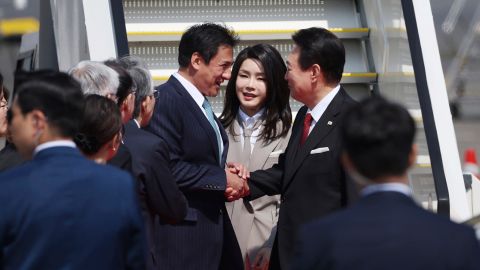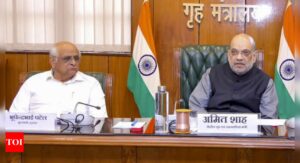South Korean leader lands in Japan for first visit in 12 years for fence-mending summit | CNN

CNN
—
South Korean President Yoon Suk Yeol arrived in Japan Thursday for a fence-mending summit, the first such visit in 12 years as the two neighbors seek to confront growing threats from North Korea to rising concerns about China.
Those shared security challenges were on stark display just hours before the trip when North Korea fired a long-range ballistic missile into the waters off the east coast of the Korean Peninsula – the fourth intercontinental ballistic missile launch in less than one year.
Japan’s Chief Cabinet Secretary Hirokazu Matsuno condemned the latest launch, calling it a “reckless act” that “threatens the peace and security of our country, the region, and the international community.”
The summit between Yoon and Japanese Prime Minister Fumio Kishida is a crucial step to mend frayed ties after decades of disputes and mistrust between two crucial US allies in Asia.
Yoon’s office has hailed it “an important milestone” in the development of bilateral relations.
The two East Asian neighbors have a long history of acrimony, dating back to Japan’s colonial occupation of the Korean Peninsula a century ago.
The two normalized relations in 1965, but unresolved historical disputes have continued to fester, in particular over colonial Japan’s use of forced labor and so-called “comfort women” sex slaves.
In recent years the often fraught relations have undermined efforts by the United States to present a united front against North Korea – and the growing assertiveness of Beijing.
Now, the region’s two most important allies for the US appear ready to turn a new page in bilateral ties.
Much of that is driven by deepening security concerns about Pyongyang’s ever more frequent missile tests, China’s increasingly aggressive military posturing and tensions across the Taiwan Strait – an area both Tokyo and Seoul say is vital to their respective security.
Before departing for Tokyo, Yoon told international media on Wednesday “there is an increasing need for Korea and Japan to cooperate in this time of a polycrisis,” citing escalating North Korean nuclear and missile threats and the disruption of global supply chains.
“We cannot afford to waste time while leaving strained Korea-Japan relations unattended,” Yoon said.
Analysts say this outreach is a break from the past.
Under Yoon’s predecessor Moon Jae-in, South Korea’s relationship with Japan was “openly combative,” said Joel Atkinson, a professor specializing in Northeast Asian international politics at Hankuk University of Foreign Studies in Seoul.
“So this visit is significant, sending a strong signal that under the Yoon administration, both sides are now working much more cooperatively,” Atkinson said.

The thaw in relations comes after South Korea took a major step toward resolving a long-running dispute that plunged ties to their lowest point in decades.
Last week, South Korea announced it would compensate victims of forced labor under Japan’s occupation from 1910 to 1945 through a public foundation funded by private Korean companies – instead of asking Japanese firms to contribute to the reparations.
The move was welcomed by Japan and hailed by US President Joe Biden as “a groundbreaking new chapter of cooperation and partnership between two of the United States’ closest allies.”
The deal broke a deadlock reached in 2018, when South Korea’s Supreme Court ordered two Japanese companies to compensate 15 plaintiffs who sued them over forced labor during Japan’s colonial rule.
Japan did not agree with the South Korean court’s 2018 decision, and no compensation had been paid by Tokyo.
That led to rising tensions between the two sides, with Japan restricting exports of materials used in memory chips, and South Korea scrapping its military intelligence-sharing agreement with Tokyo during the presidency of Moon.
But the Yoon administration has been striving to improve relations between Seoul and Tokyo – even if it means pushing back against domestic public pressure on contentious, highly emotional issues like the compensation plan.
Apart from the growing North Korean nuclear threat, China appears to have been a big factor in Yoon’s willingness to face the domestic backlash over the compensation deal, said Atkinson, the expert in Seoul.
“The administration is making the case to the South Korean public that this is not just about Japan, it is about engaging with a wider coalition of liberal democracies,” he said.
“What South Koreans perceive as Beijing’s bullying, arrogant treatment of their country, as well as its crushing of the Hong Kong protests, threats toward Taiwan and so on, have definitely prepared the ground for that.”
Even before the pivotal move to settle the historical dispute, Seoul and Tokyo have signaled their willingness to put the past behind them and foster closer relations.
On March 1, in a speech commemorating the 104th anniversary of South Korea’s protest movement against Japan’s colonial occupation, Yoon said Japan had “transformed from a militaristic aggressor of the past into a partner” that “shares the same universal values.”
Since taking office, the two leaders have embarked on a flurry of diplomatic activities toward mending bilateral ties – and deepening their joint cooperation with Washington.
In September, Yoon and Kishida held the first summit between the two countries since 2019 in New York on the sidelines of the United Nations General Assembly, where they agreed to improve relations.
In November, the two leaders met Biden in Cambodia at a regional summit, where they “commended the unprecedented level of trilateral coordination” and “resolved to forge still-closer trilateral links, in the security realm and beyond.”
Closer alignment among the US, Japan and South Korea is an alarming development to China, which has accused Washington of leading a campaign to contain and suppress its development.
Beijing is particularly worried about the involvement of South Korea in the Quadrilateral Security Dialogue – better known as “the Quad” – an informal security dialogue among the US, Japan, Australia and India. It views the grouping as part of Washington’s attempt to encircle the country with strategic and military allies.
Last week, a senior South Korean official said Seoul plans to “proactively accelerate” its participation in the Quad working group.
“Although we have not yet joined the Quad, the Yoon Suk Yeol government has been emphasizing its importance in terms of its Indo-Pacific strategy,” the official told reporters during a visit to Washington, D.C., Yonhap reported.






